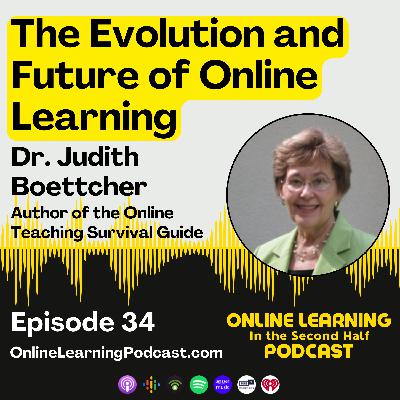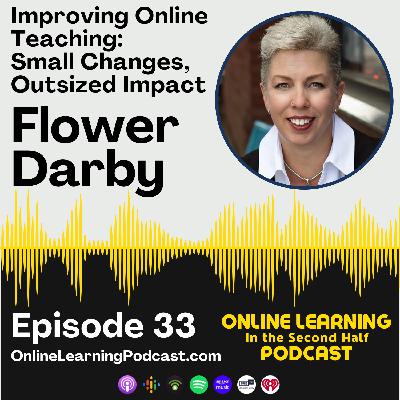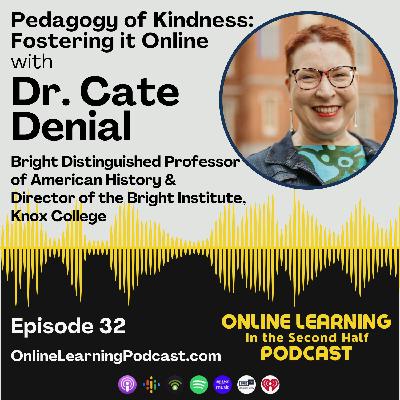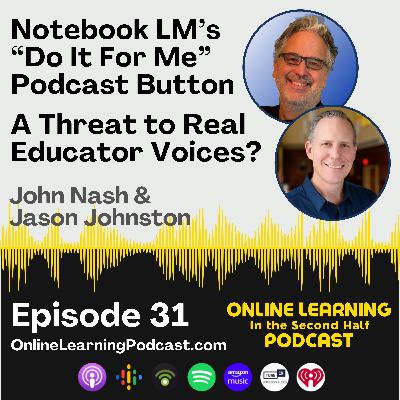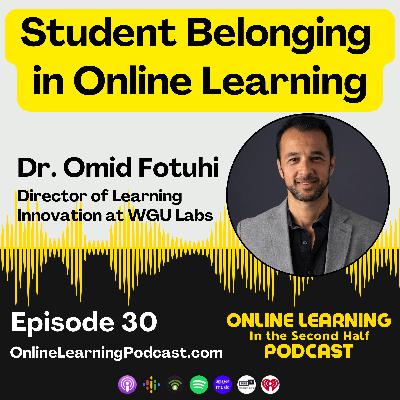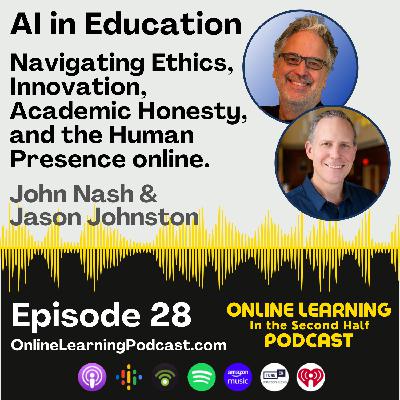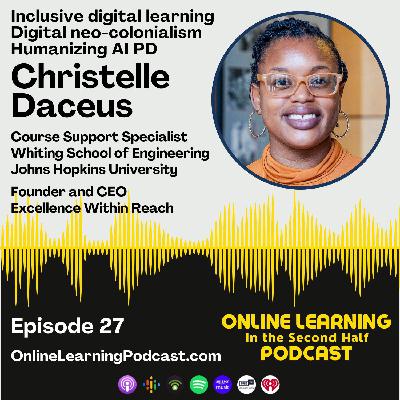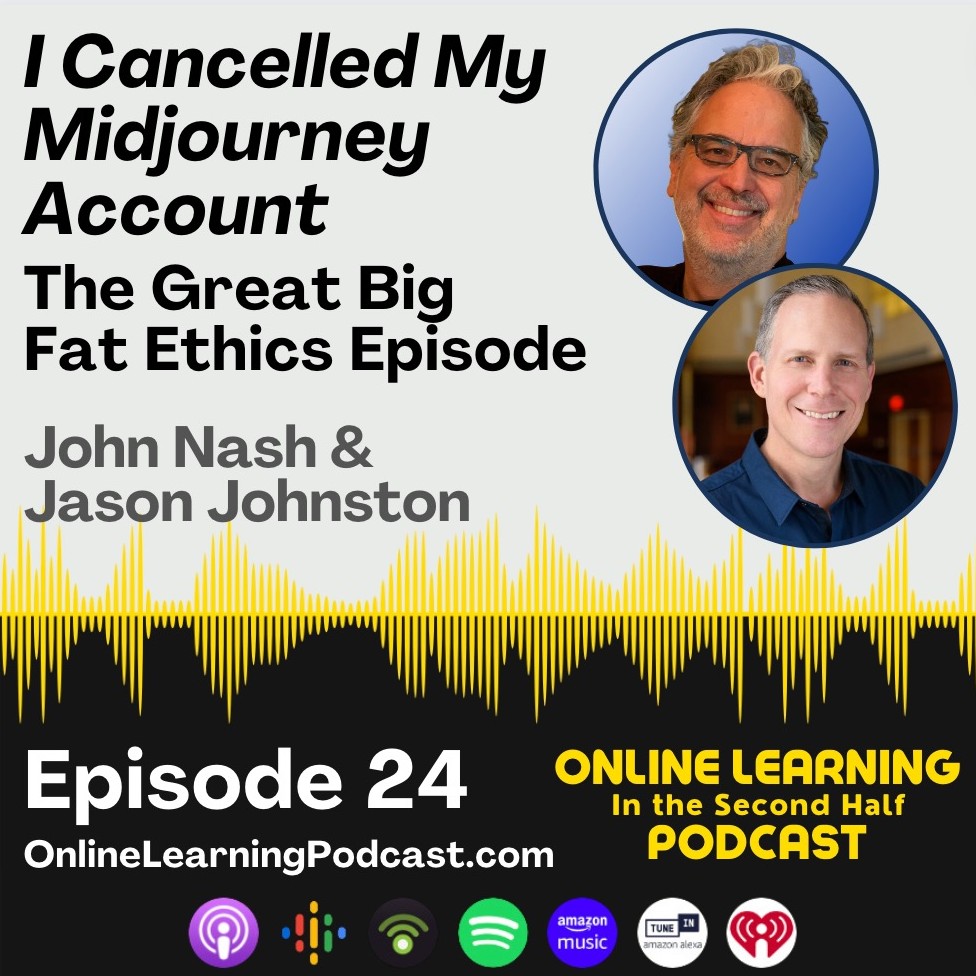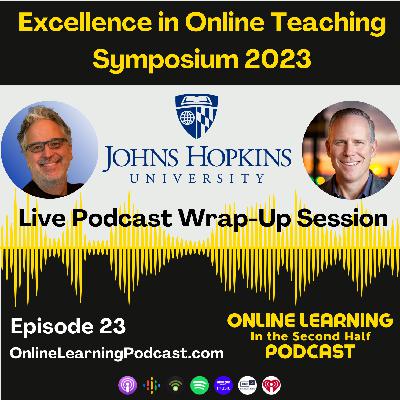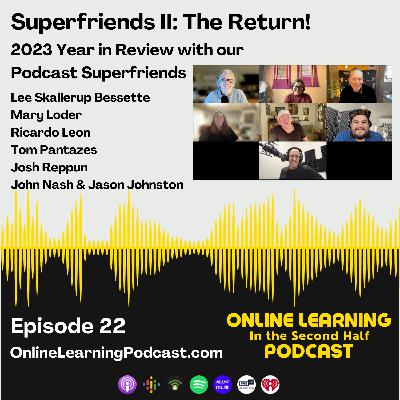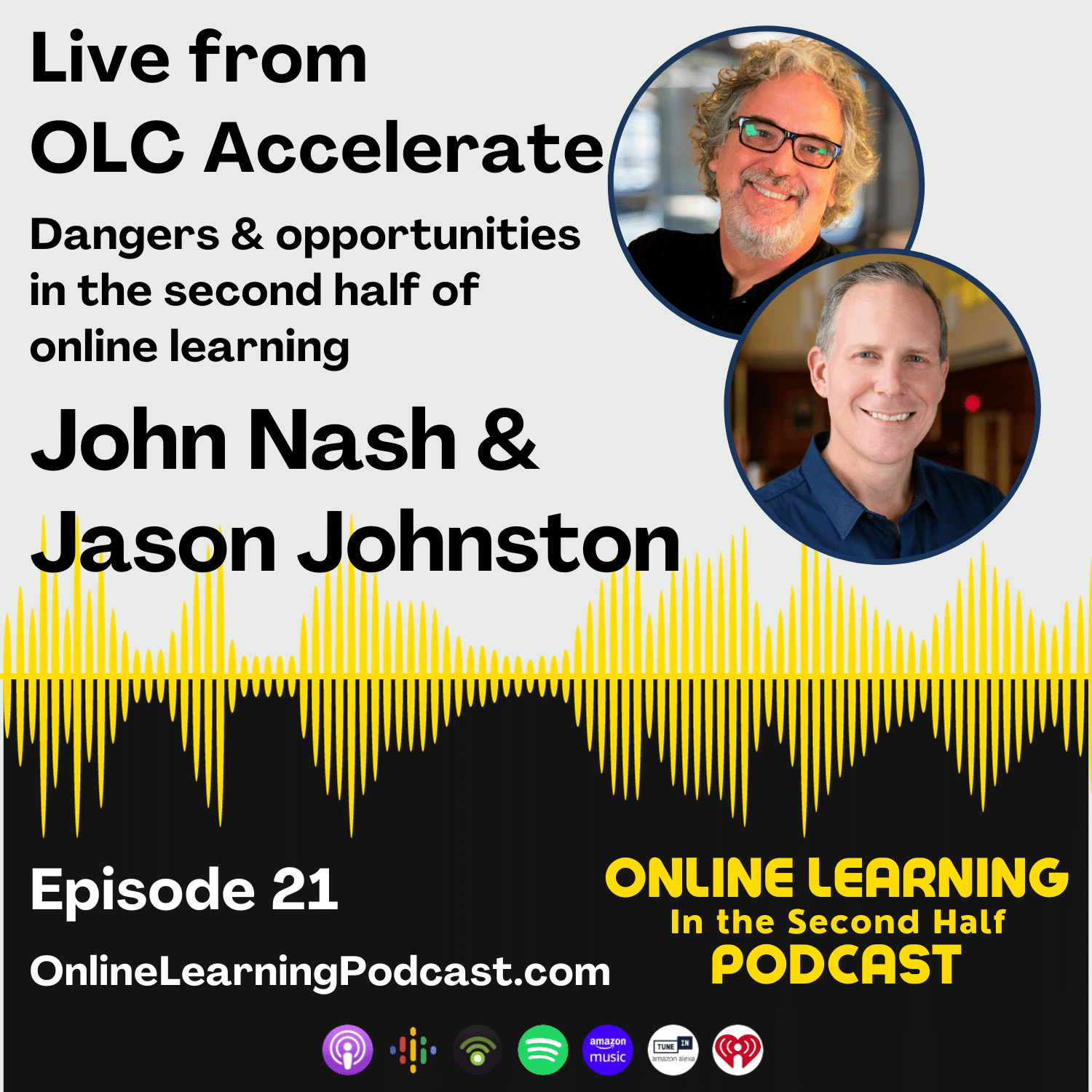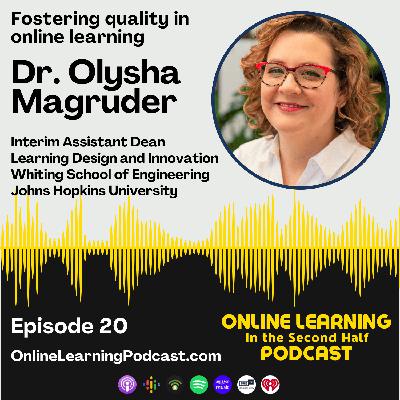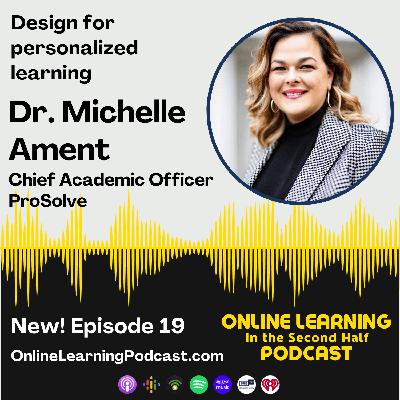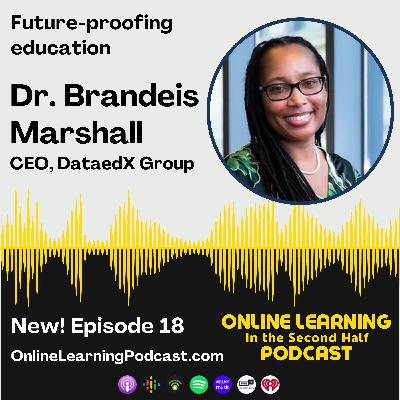EP 16 - Dr. Kristen DiCerbo - Khan Academy’s Chief Learning Officer and the creation of Khanmigo
Description
In this episode, John and Jason talk with Dr. Kristen DiCerbo about how Khamigo was born, how it works, and how it might help transform and humanize online learning.
Join Our LinkedIn Group - Online Learning Podcast
Resources:
- Kristen DiCerbo
- Check out the Khanmigo page
- Khan Academy / Canvas Instructure Press Release where they announce their partnership
- More information about the ICAP Framework
Transcript
We use a combination of computer-generated transcriptions and human editing. Please check with the recorded file before quoting anything. Please check with us if you have any questions!
Pre-Banter
[00:00:00 ] Jason Johnston: Was Khanmigo able to join us on the call today?
[00:00:04 ] Kristen DiCerbo: Khanmigo right now does not have text to speech, so we'll not be on the podcast.
[00:00:09 ] Jason Johnston: All right, probably too busy. There's a lot of people to support out there. And they're a bit of a rock star. So they're probably at the White House or something
[00:00:17 ] Kristen DiCerbo: Most likely, yeah exactly. Some world leaders. Yes.
[00:00:20 ] Jason Johnston: Leaders guiding policy across G20 or something like that.
[00:00:25 ] Kristen DiCerbo: yeah, exactly.
Start
[00:00:26 ] John Nash: I'm John Nash here with Jason Johnston.
[00:00:29 ] Jason Johnston: Hey John. Hey everyone. And this is Online Learning in the Second Half, the Online Learning Podcast.
[00:00:34 ] John Nash: Yeah. We're doing this podcast to let you in on a conversation we've been having for the last two and a half years about online education. Look, online learning has had its chance to be great and some of it is, but a lot of it still isn't. And so how are we going to get to the next stage?
[00:00:50 ] Jason Johnston: That's great question. How about we do a podcast and talk about it?
[00:00:54 ] John Nash: Perfect, what do you want to talk about today?
[00:00:58 ] Jason Johnston: Well, I'm very excited about our guest today. We're going to be talking with Dr. Kristin DeCerbo, the Chief Learning Officer at Khan Academy. Welcome Dr. How are you?
[00:01:11 ] Kristen DiCerbo: Good, good. And please call me Kristen. It's great to be here today.
[00:01:14 ] Jason Johnston: Well, it is great to have you here. And we just wanted to start off by just getting to know you just a little bit. Tell us a little bit about your current role at Khan Academy.
[00:01:25 ] Kristen DiCerbo: Yeah, so a chief learning officer can mean lots of different things and lots of different organizations. So, At Khan Academy, I lead our content team, our product management team, our design team, and our community support team. So most of what you see, on the Khan Academy site is built and created by a lot of the folks that are on my team.
And I do not lead the engineers, they're a whole
[00:01:51 ] Jason Johnston: Okay. That's good.
[00:01:52 ] Kristen DiCerbo: group, not them. But I come from an educational psychology background. So my PhD is in educational psychology, and so I don't have the traditional kind of product background that some educational technology folks who lead those kinds of teams do.
And instead, I bring a lot of, you know, experience and insight about how people learn. And we try to build that into then the articles, the exercises, the videos, and all of the experiences students have on the site.
[00:02:24 ] Jason Johnston: And so, you mentioned about your education, you've got a PhD in educational psychology. Is that what you said?
[00:02:30 ] Kristen DiCerbo: Yes. I actually thought when I went to grad school that I was going to be a school psychologist. And so did a research practitioner program where I was doing. All of the work and training to be a school psychologist and doing all of the work on how you diagnose learning difficulties and all of that and did a whole bunch of research and kind of fell in love with that side of things too.
But then did end up being a school psychologist in a school in Arizona where I live. One of the schools I worked at had 1, 200 kindergarten through third graders, if you can imagine in a school,
[00:03:05 ] John Nash: No, I can't imagine.
[00:03:07 ] Kristen DiCerbo: And 80 percent of them had a home language that was not English which makes them figuring out why are kids struggling to learn quite a challenge , but also really drove home for me some of the Potential for education technology and could see, you know, there's, we have all of these kids who need extra support and extra help and all different levels in a classroom and how does a teacher help start to differentiate all of those.
So that was a bit of my first thinking about how do we, how could we use technology to help support these kids?
[00:03:44 ] Jason Johnston: So you got a lineup of kids waiting to see you at the school. And then did you just think one day, man, I'd like to learn more about doing this through a computer or through online or how did you get into Khan Academy?
[00:03:55 ] Kristen DiCerbo: Yeah, so it's a little bit of a winding road. So at first I was, after a couple of years, was thinking I was going to make a career change, thought I might go be a professor and did academic job applications. In that process, I got back in touch with someone who had been one of my statistics professors at Arizona State and he had gone to work for Cisco, the networking company, which sounds crazy, but Cisco has something they call the Networking Academy Program, where they create curriculum and assessments that they give away to high schools and community colleges for free to help students learn computer networking skills.
And so I got in touch with him to write me letters of recommendation for these academic jobs, and he said, of course, I'll write you those letters, but you should think about coming to work here. We're doing this online learning thing. And we have a whole lot of engineers that are starting to, you know, help us write this curriculum.
But we need some people who know about learning and assessment to think about this. And I was like, huh, that's kind of interesting. And the kind of the kicker is, and you could create these things that touch hundreds of thousands of learners every year, and really have that kind of impact on the world.
And so I was convinced and. So went to Cisco and spent a good amount of time doing some really interesting things around simulations and simulation based assessment, because it turns out that the high school students would practice on this expensive networking equipment, and they'd break it, and they didn't know how to fix it, so we said, well, let's create some simulation tools so they can configure this and try those crazy what if questions in a low risk environment and work through those.
And then we said, wait. We are, by doing this, we're capturing all of the information about how they're configuring these devices. Why are we giving them a multiple choice test about networking when we can actually see them doing the skills that we're trying to create? And so, got into performance based assessments and thinking about how we can use that digital data to understand what students know and can do. And from there, I was presenting on some of these ideas and some folks from Pearson approached both me and my mentor, who was the one who brought me and said, Hey, we're starting something called a Research and Innovation Network at Pearson.
And would you like to take some of these ideas you've been playing with and try them out in domains other than computer networking? And, you know, think about how this might fit across K 12. And that was pretty enticing. And obviously Pearson also has big reach and big opportunities. So went there and spent a good amount of time there in a research role.
And then gradually over time, as big companies do reorganizations and changes ended up leading a team of learning designers and researchers who were working closely with product teams to. building based on what we know from the learning sciences into some of the products and places things that offerings that were being released at Pearson.
And then about, oh, three and a half years ago or so, I was thinking about what my next step might be. And I was talking to some friends and said, I think I want something smaller. I think I want to go in the nonprofit space. And I think, you know, I was a VP at Pearson. I think I'm going to go like something like a chief academic officer, chief learning officer.
And three weeks later, this job that I have now was posted. And I said, this is what I was just describing and it all worked out. And so that's how I got to Khan Academy.
[00:07:36 ] John Nash: Did it feel, going back to your experience developing performance based assessments, and that was in an online environment, did that feel different and kind of exciting? Because that seems like



